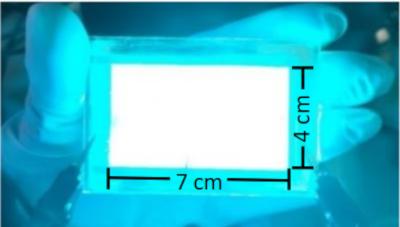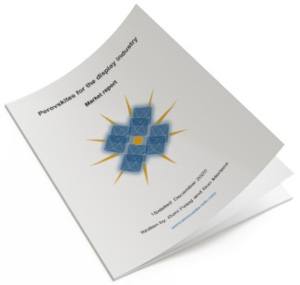Perovskite LEDs - recent news - Page 7
Researchers demonstrate large-area sky-blue perovskite LEDs
A research group, led by Prof. XIAO Zhengguo from the University of Science and Technology of China (USTC) of the Chinese Academy of Sciences, has developed large-area and efficient sky-blue perovskite light-emitting diodes (PeLEDs) by blade-coating supersaturated perovskite solution.

Metal halide PeLEDs can achieve high luminance at low voltage due to their high electrical conductivity, making them ideal for the next generation of energy-saving lighting. Blue/sky-blue PeLEDs are essential for white lighting, but the EQE of blue light is relatively low since the crystallization process of such perovskite films is difficult to control, which results in poor film quality.
The Perovskite for Displays Market Report updated to April 2022
Perovskite-Info is proud to announce an update to our Perovskite for the Display Industry Market Report. This market report, brought to you by the world's leading perovskite and OLED industry experts, is a comprehensive guide to next-generation perovskite-based solutions for the display industry that enable efficient, low cost and high-quality display devices. The report is now updated to April 2022.
Reading this report, you'll learn all about:
- Perovskite materials and their properties
- Perovskite applications in the display industry
- Perovskite QDs for color conversion
- Prominent perovskite display related research activities
The report also provides a list of perovskite display companies, datasheets and brochures of pQD film solutions, an introduction to perovskite materials and processes, an introduction to emerging display technologies and more.
Researchers achieve large-area and efficient sky-blue perovskite LEDs via blade-coating
Researchers from Beihang University and the University of Science and Technology of China (USTC) of the Chinese Academy of Science have developed efficient and large-area sky-blue Perovskite-based LEDs, through blade-coating supersaturated precursors.
This approach results in nucleation in the solution phase with much higher nucleation sites, and a faster crystallization rate. The uniform films formed by this method reportedly exhibit smaller grain size, lower trap density, and higher radiative recombination rate.
Researchers advance towards creating more stable blue perovskite LEDs
Researchers from the Okinawa Institute of Science and Technology Graduate University (OIST) have developed blue LEDs based on metal halide perovskites, that, for the first time, uses asymmetrical bridges to hold the layers of perovskite together, creating a more stable structure.

'Perovskites have the potential to be a real game-changer in the lighting industry,' said first author Dr. Yuqiang Liu, a former post-doctoral researcher in the OIST Energy Materials and Surface Sciences Unit and currently a professor at Qingdao University, China. 'In only a few short years, the efficiency of perovskite LEDs ' how well they can transfer electrical energy into light energy ' has shot up to a level that rivals traditional LEDs, and soon will surpass them.'
The Perovskite for Displays Market Report updated to January 2022
Perovskite-Info is proud to announce an update to our Perovskite for the Display Industry Market Report. This market report, brought to you by the world's leading perovskite and OLED industry experts, is a comprehensive guide to next-generation perovskite-based solutions for the display industry that enable efficient, low cost and high-quality display devices. The report is now updated to January 2022.
Reading this report, you'll learn all about:
- Perovskite materials and their properties
- Perovskite applications in the display industry
- Perovskite QDs for color conversion
- Prominent perovskite display related research activities
The report also provides a list of perovskite display companies, datasheets and brochures of pQD film solutions, an introduction to perovskite materials and processes, an introduction to emerging display technologies and more.
Researchers review ways to process transparent electrodes without causing damage to perovskite solar cells
A research team led by Erkan Aydin and Stefaan De Wolf from the KAUST Solar Center, along with co-authors from Turkey, the Netherlands and Spain, has presented an overview on the process of stopping damage from occurring to devices during the creation of transparent electrodes, particularly for a technique known as sputtering.
Damage from adding electrical contacts to sensitive semiconductors, including perovskites, can be mitigated using a buffer layer and optimized deposition. The new review gives a comprehensive overview for the origin and mitigation strategies for this technological problem.
Researchers develop perovskite-based 'unbreakable' glass for displays, lighting and more
A collaborative research team that included scientists from the University of Queensland (UO), the University of Leeds, UniversiteÌ Paris-Saclay and University of Cambridge, has developed perovskite-based composite glass that is virtually unbreakable and delivers crystal clear image quality.
UQ's Dr. Jingwei Hou said the discovery was a huge step forward in perovskite nanocrystal technology as previously, researchers were only able to produce this technology in the atmosphere of a laboratory setting as lead-halide perovskites NCs are extremely sensitive to light, heat, air and water. However, Hou said that 'Our team of chemical engineers and material scientists has developed a process to wrap or bind the nanocrystals in porous glass. This process is key to stabilizing the materials, enhancing its efficiency and inhibits the toxic lead ions from leaching out from the materials.'
Inkjet-printed flexible perovskite LEDs could open the door to new applications
Researchers from Florida State University and Washington University in St. Louis have developed a new material for displays and a novel way to fabricate it'using an inkjet printer. The team used organometal halide perovskites ' with a novel twist.
The traditional way to create a thin layer of perovskites, which is in liquid form, is to drip it onto a flat, spinning substrate, in a process known as spin coating. As the substrate spins, the liquid spreads out, eventually covering it in a thin layer. From there, it can be recovered and made into perovskite LEDs, or PeLEDs. A lot of material, however, is wasted in that process'as the substrate spins at several thousand RPM, some of the dripping perovskite splatters and flies away, not sticking to the substrate. The researchers substituted this process with one based on an inkjet printer.
IIT Madras team designs perovskite-based white light emitters for LEDs
Researchers at the Indian Institute of Technology Madras (IIT-M) have developed a perovskite-based white light emitter for use in energy-efficient Light Emitting Diodes or LEDs.
As conventional LED materials cannot emit white light, to produce white light, specialized techniques such as coating blue LED with yellow phosphor and combining blue, green, and red LEDs have been used, along with a worldwide search for materials that can directly emit white light.
Researchers synthesize double perovskite nanocrystals with bright emission based on triplet STEs
Unlike the narrow band emission based on free excitons in lead-perovskite nanocrystals (NCs), the low electronic dimensionality in lead-free double perovskite NCs can lead to self-trapped excitons (STEs), generating a broadband emission. To date, how the singlet/triplet STEs influence the photoluminescence properties and whether triplet STEs can generate efficient emission in double-perovskite NCs has been unclear.

A research team, led by Prof. Han Keli and Yang Bin from the Dalian Institute of Chemical Physics (DICP) of the Chinese Academy of Sciences, recently synthesized double perovskite nanocrystals with bright photoluminescence emission based on triplet STEs.
Pagination
- Previous page
- Page 7
- Next page





